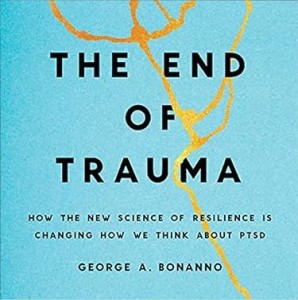 When faced with extreme adversity—like violent incidents or life-threatening situations—we often assume that trauma is inevitable and that PTSD will follow. We then may discuss trauma as a chronic and permanent condition: “I am a traumatized individual.” But how likely is it that we’ll actually develop PTSD? And what makes some people able to withstand such events more effectively than others? How often do we have the capacity to build resilience?
When faced with extreme adversity—like violent incidents or life-threatening situations—we often assume that trauma is inevitable and that PTSD will follow. We then may discuss trauma as a chronic and permanent condition: “I am a traumatized individual.” But how likely is it that we’ll actually develop PTSD? And what makes some people able to withstand such events more effectively than others? How often do we have the capacity to build resilience?
In The End of Trauma, internationally recognized psychologist George A. Bonanno challenges the conventional wisdom on trauma, offering a necessary change in how we discuss trauma, understand, and treat it. Especially in the aftermath of events like 9/11 and now the global pandemic, Bonanno argues that trauma isn’t as prevalent as we often believe, and that most people are surprisingly resilient when faced with life’s toughest challenges. This fresh perspective shifts the focus from inevitable trauma to the remarkable capacity for recovery that most of us possess.
What we too often label as PTSD might be a missed opportunity to respect the natural process of adapting to difficult situations. Bonanno, a leading expert in the field, draws on decades of groundbreaking research, balancing personal stories of resilience with cutting-edge findings from psychology and neuroscience. Through this lens, he explains what helps us bounce back, why some people struggle more than others, and how we can all better manage stress when life gets difficult.
Personally, as a university instructor and researcher in Educational Psychology and Neuroscience, I found this to be one I wish I could add to my students’ ever-expanding reading list. Many students enter psychology with the idea that they will label a struggle as a feature or trait of the individual that needs to be respected as if it is a permanent feature of who they are. And when I work with teachers, they often see trauma as a useful label to dismiss student capacity for learning. Both groups are well-meaning, trying to be compassionate but they miss the compassionate and hopeful point that Bonanno is making here. They are reflecting societies potential misunderstandings. Some degree of struggle is natural, and resilience is learned. Yes, there are still extreme situations, but what is often called PTSD or Trauma is often a stage in adapting. This perspective puts teachers and therapists in the supportive role of helping and scaffolding the learner during this developmentally important process. And it puts you in the driver’s seat of your own struggles.
One of the book’s most innovative contributions is the introduction of the flexibility sequence—a model that outlines the mental steps we take to navigate challenges. Flexibility, as Bonanno reveals, isn’t a fixed trait but a natural function of the human mind, one that needs exercise and practice like all skills. By understanding and harnessing this flexibility, we can better understand the roots of trauma and build greater resilience for the future.
Bonanno’s narrative is not just scientifically rigorous; it’s also deeply engaging, gripping your imagination with artful narrative while honoring the impeccable science of resilience. This makes The End of Trauma not only a valuable read for professionals in the field but also for anyone interested in understanding how they and those they support can overcome extraordinary challenges. It prepares you to build resilience with the potential opportunities that struggle presents. Ultimately, the book provides an optimistic, compassionate, and agentic framework for reexamining our approach to trauma, urging us to appreciate our own mind’s capacity for resilience and to use it to navigate life’s toughest moments. Understand, appreciate, build strategies, and prepare to grow.



